 |
Convert H263 to BMP Sequence
|
The BMP file format, also known as bitmap image file or
Device Independent Bitmap (DIB) file format or simply a bitmap, is a raster graphics
image file format used to store bitmap digital images, independently of the display
device (such as a graphics adapter), especially on Microsoft Windows and OS/2
operating systems. The BMP is stored uncompressed; so it's a lossless image format,
but file size is very big.
H263 to BMP Converter Software converts H263 to BMP sequence files.
With the software, you could get every frame image of H263 in BMP format. The
converter software also supports other output image formats such as JPG,
PNG, and TIFF. You can convert only a part of H263 to BMP instead of the entire
file. And you can set how many frames per second to be extracted with the software.
The output BMP files look something like this.
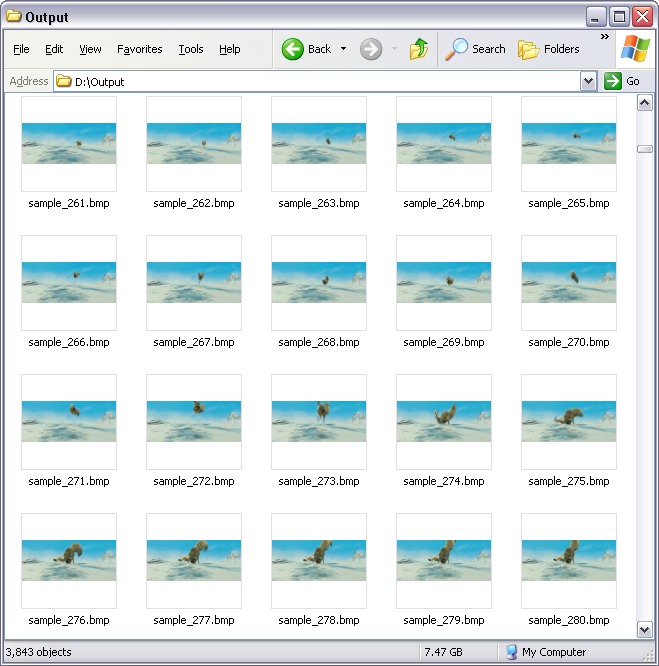
The software also supports other formats and portable devices such as 3G2, OGG Vorbis, MPG, M4B (MPEG-4 audiobook), Android Tablet, Windows Phone, MP2,
etc. The software could convert FLV to M4V, WebM to Android Tablet, M2TS to H.264, MPEG to OGG, 3GP to M4B (MPEG-4 audiobook), and so on.
H263 to BMP Software supports batch conversion and, is compatible
with Windows 10/8/7/Vista/XP/2000.

What is H263?
H263 video is a video codec standard originally designed as a low-bitrate
compressed format for videoconferencing. H.263 is a provisional ITU-T standard,
it is due to be published sometime in 1995/1996. H.263 is a hybrid of interframe
compression and intraframe transform coding. ITU-T SG15 H.263 came out
in February 1995. H.263 is a standard video-conferencing codec. As such,
it is optimized for low data rates and relatively low motion. 4CIF and
16CIF are 4 and 16 times the resolution of CIF respectively. Most new videoconferencing
products now include H.264 as well as H.263 and H.261 capabilities. It
was initially made to serve H.324 based low-bitrate internet communication
systems (videoconferencing and telephony), but as new extensions were added
to the further versions, H.263 found use in other applications. H.263 was
developed as an evolutionary improvement based on experience from H.261,
the previous ITU-T standard for video compression, and the MPEG-1 and MPEG-2
standards. It was developed by the ITU-T Video Coding Experts Group (VCEG)
in a project ending in 1995/1996 as one member of the H.26x family of video
coding standards in the domain of the ITU-T. Despite the fact that now
H.264 is more extended, H.263 is still widely employed by internet applications
such as Flash Video content (as used on sites such as YouTube, Google Video,
MySpace, etc.), desktop video conferencing, video telephony, surveillance
and monitoring, 3GPP files for playback on mobile phones. It is also required
for IP Multimedia Subsystem (IMS) and Multimedia Messaging Service (MMS).
It was further enhanced in projects known as H.263v2 (also known as H.263+
or H.263 1998), MPEG-4 Part 2 and H.263v3 (also known as H.263++ or H.263
2000).
What is BMP?
A BMP (bitmap) file is an image format created by Microsoft and IBM to
store certain types of digital information for use in programs and to support
certain elements of the Windows operating system. You can create BMP files
in Microsoft Paint, a graphics program that comes standard with most Windows
systems. The BMP file format is capable of storing 2D digital images of
arbitrary width, height, and resolution, both monochrome and color, in
various color depths, and optionally with data compression, alpha channels,
and color profiles. The BMP file format, sometimes called bitmap or DIB
file format (for device-independent bitmap), is an image file format used
to store bitmap digital images, especially on Microsoft Windows and OS/2
operating systems. The purpose of the color palette in indexed color bitmaps
is to inform the application about the actual color that each of these
index values corresponds to. The new extended headers can be used with
some GDI functions instead of the older ones, providing more functionality.
Since the GDI supports a function for loading bitmap files, typical Windows
applications use that functionality. One consequence of this is that for
such applications, the BMP formats that they support match the formats
supported by the Windows version being run. BMP was designed to contain
bitmaps of different color resolutions so they could easily be exchanged
between different internal devices. Hence the name device independent bitmaps,
or DIB. As opposed to a device-dependent bitmap, the DIB/BMP is an external
bitmap where it is transported in metafiles. A bitmap image file loaded
into memory becomes a DIB data structure - an important component of the
Windows GDI API. The in-memory DIB data structure is almost the same as
the BMP file format, but it does not contain the 14-byte bitmap file header
and begins with the DIB header.
How to Convert H263 to BMP Sequence?
- Free Download H263 to BMP Conversion
Software
- Install the Program by Step-by-step Instructions
- Launch H263 to BMP Software
- Choose H263 Files

Click "Add Files" to choose H263 files.
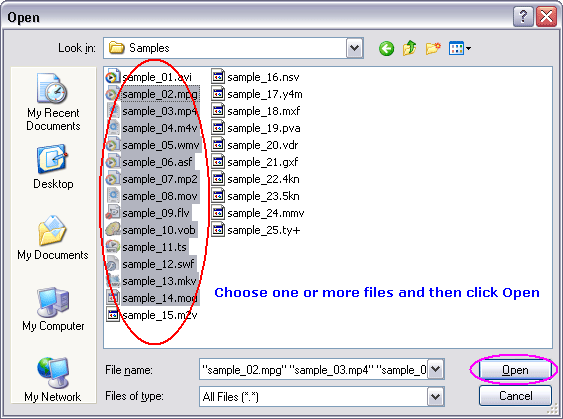
Choose one or more H263 files you want to convert and then click Open.
H263 to BMP Software will open H263 files and get file information
of the file such as width, height, frame rate, video bit rate, audio sample rate,
audio bit rate, audio channels, and then display the information of H263 file
at conversion list.
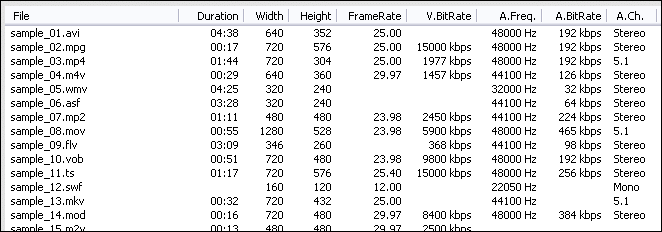
- Choose Output Format
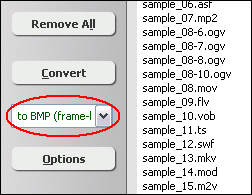
Click on combo-box of output format and then choose "to BMP (image sequence)".
- [Optional, for advanced user]
Set BMP Encoding Parameters
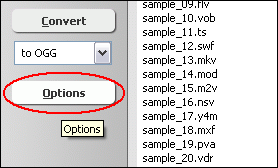
If you want to change BMP encoding parameters such as frame rate, video size,
aspect ratio, and so on, please click "Options".
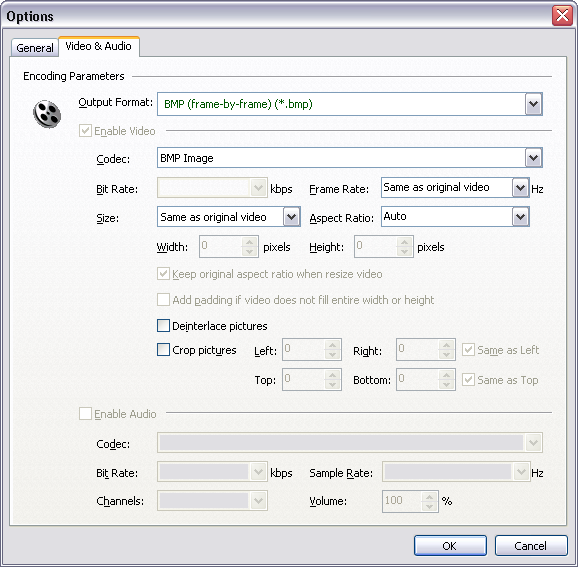
And then, switch to tab "Video & Audio" and choose "BMP
(image sequence)" at "Output Format", and then set options
for image encoding.
- Convert H263 to BMP
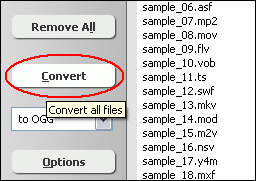
Click "Convert" to convert H263 to BMP sequence.

The software is converting H263 files to BMP.
- View and Browse BMP Files
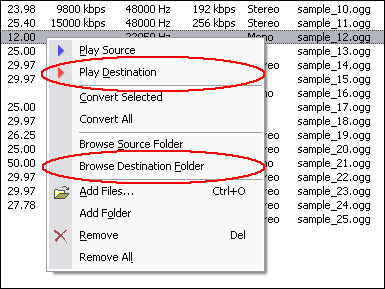
When conversion completes, you can right-click converted item and choose "Play
Destination" to view the first outputted BMP file; or choose "Browse
Destination Folder" to open Windows Explorer to browse the outputted BMP
files.
- Done
Top
H263 to BMP Software is 100% clean and safe to
install. It's certified by major download sites.

Convert H263 to BMP Related Topics:
|












